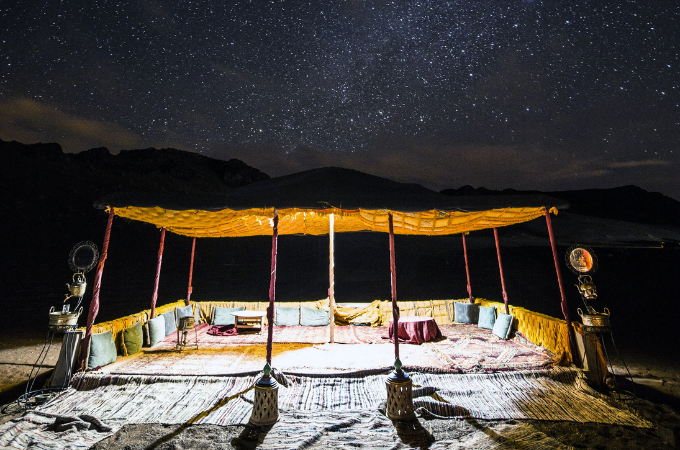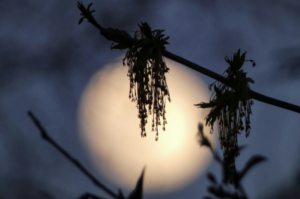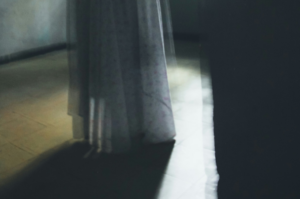
“I trace my roots all the way to the dusty plains of Niger,” the old bandit said. He was past sixty, balding, with deep-set eyes that flash with passion when he spoke. “I still remember rushing through the border in a gale of sweat, dread, and dust.” His eyes were strangely lifeless. “So many years ago, a boy of ten, untested, driven like chaff through Bilma by the whims of implacable fate.”
The woman perched on the mat raised her beady eyes to him. “You miss home.” It wasn’t a question, but it startled her to find her words bare the crisp of a question tag thus diminishing her power. She had been trained well to question them, to listen to them, to sift through and take down their words, looking for the half-truths.
“You miss home,” she said again, eyes raised to him.
“It is not the home I miss…” his voice seemed to trail and break.
“Then what is it that you do miss?” she asked, slightly on edge.
The old bandit paused, sniffing through the air with his pointed nose. There were several crow’s feet lining his eyes underneath, adding a severe look to his already icy features. Though age had crept into those eyes, nothing could diminish the light that was flickering, like dying embers in a pool of darkness. There was warmth there, real warmth and she knew he would be gentle, especially with women—his women. She brushed the thoughts away into a familiar crevice, the part of her mind where all junk and wild thoughts end up.
Outside their camp she could see women bringing in the tripods, encumbered with pots, logs, and salt. Slave wives. Tokens of murder. Remnants of a people who were taken in their sleep.
“They say dreams of conquest first stir in boyhood. Then it follows the young mind into adulthood where it warps into baser yearnings such as lust. Let’s say the urge to take another man’s woman, the urge to bed a maid in a field, the urge to milk a cow that was once a shy heifer,” he pauses, seemingly weighing her reaction. A twitch curled her lower lip. The old bandit narrowed his eyes, “it never really goes away, this determination to yield oneself to dreams,” his eyes gleamed, “of deeds both fell and low and noble.” The old bandit had a sense of nobility to himself. Almost like a king or some high lord. Why am I here? It frightened her to remember she asked for this.
“The boy never leaves the man,” she heard herself say. The bandit nodded. What’s the point? “Is that what you miss, your boyhood?” she asks, not daring to ask the questions that swelled in her head like a wound gone purple with pus and watery blood. “I don’t miss my girlhood.”
“Every boy begins life with a hint of what he is meant to be. Yes, that spark that starts in the eyes, spilling down to the tongue, awash with outbursts mean and proud alike. Filling the heads of young minds with adventures as if they could reach the heights of Amina, scion of Nikatau na Zazzau.” He seemed to suck in air.
“Queen Amina led men into war, conquered territories, and made men pay her homage. She was born to rule, a revelation she had come to know as a blood royal. It is like waking up from sleep at the crack of dawn knowing what to do throughout the day. A thing most young minds lack. They had never been told they could amount to much, that they found out themselves,” she filled in, remembering her history classes. A pity even that had been shelved from the Nigerian curriculum.
The old bandit did not turn a hair. His pale face was a mask. “Amina was a woman. A woman who would have been a god were she born a man!”
The woman giggled, lightly. “Amina would approve.” He ignored the subtle barb, turning his face to a group of boys herding cattle, chattering away. He was remembering his youth, of days in the sun, of days under the moonlight, of days of hay, straw, flint, and dung. His way—the only way ever known to him—the Fulani way.
“You asked me what I miss. I tell you this: I miss the hint of promise, the weakened will to act upon it, reliance on Allah’s guidance to lead me there, to my fate. It’s what I felt crossing the border into Nigeria decades ago. My young mind dreamed of change. A new life. A life for a boy, a lover of the wild. To live the way his own father lived. But did that boy live after settling in?” Does the boy in every man dream still?
“Did he?” she asked, craning her neck to look at him. The old bandit cocked his head to her. For the first time since being led here he was taking her in, really. His pale eyes shone with silence; a deathly and kingly one. She was conscious of herself, suddenly. She adjusted her cleavage. His eyes never left her as she rearranged her world into bits, seeking her own meaning. What is duty?
“The boy never got to Nigeria,” the old bandit cut in.
That opened her ears. The same itching ear that brought her to this place, the very one no one of the North would live in. “What ever happened to the boy?” she asked, finding herself amidst the chaos. “Were the dreams too much or did they frighten him to the extent of jettisoning them?” The old bandit’s eyes glowed. Both. He was smiling at her, remembering something from the edge of memory.
“The boy was changed in the forest. Although his first change started in the desert.” He tugged at his whiskers, shorn, and shot with white. “What the desert could not take or would not take, the forests gnawed away such that nothing was left but choice.”
She scoffed. “It all comes back to choice. It was either this or that? Where was it written that to survive one must take the substance of others?” She hesitated. “The lives of others.”
The old bandit’s face might have been chiselled from wood. It remained expressionless, giving nothing away. “It was the only choice left for the boy. He doubted himself at first but once the cool steel warms to the blood in the veins, truth dawns!”
His defiance took her breath away. She imagined him slapping her. Hitting her so hard she might chip a tooth. But she knew he wasn’t that kind of man, the kind of baser instincts. His mould was of sterner, finer stuff, of nobility. He’d be civil with women except in bed where all men are permitted to be wild. She just couldn’t keep the thoughts at bay.
At last, she spoke, “There must have been other paths. Chances to chart a different course. To live as a man.” She looked furtively at the lean-to at the base of a rock near the bandit’s camp. Three girls were boning a basin of fish. Three girls who had been taken from their classrooms in fright. Three girls who’d never see their homesteads again unless some god of thunder burst through the skies, revealing his wrath. They would have to remain here, live here all the days of their lives, jousting each day for the bitter knowledge the forests had to give. The three girls seemed half alive, as if in the process of keeping them in thrall, their vital parts had been shorn, whittled down by a careless hand. It dismayed her to see them like this, in captivity. Theirs was mercy. Others weren’t so lucky. She tore her eyes away from them, shaken, stricken.
“What do you know of a man’s ways?” the bandit demanded in a flat voice.
Enough. “A man must be brave even in the face of the unknown, defend the weak and love his woman—”
He cut her off with the wave of his hand, his first act of aggression since being in his camp. “I did not ask you how men have been taught to behave. I asked after the man himself.” His eyes shone, “I simply wish to live the way a man was meant to.”
Her sixth sense was roused. “How is a man meant to live?”
“To live free. Not afraid of the wild, unflinching from the judging eye and standing true before the accusing tongue with head held high atop a spike of veined flesh: a proud neck.”
Such eloquence left her in awe. “But if the man contemplates himself, will he remember the boy he was? That soul, which was once untainted, unspoiled.”
The old bandit pulled off his caftan and let it slip to the floor, a tangle of timeworn fabric. “The man seldom thinks for himself. He worries now about the many enemies he had made over the years. Standing ready lest some Egyptian blade grants me a red smile in my sleep.”
She gasped. The thought of blood made her shudder in the evening chill of the harmattan. The cold was wrestling for the flesh. She could feel its rage. Battling her warmth, the memory of sunny days from not so long ago. Was it yesterday already? Or a hundred years ago? Mother! What has become of me? Am I disinherited finally? Of lands, of grief, borne through flashing sighs, to live, to live, why not live? Just live? “God!” she cried out suddenly, unable to retrieve the words once they left her mouth.
The old bandit wrung his hands before steepling his fingers. “I tried to tell them that it is the will of Allah for all to live free and just. They would not hear and see reason for greed has taken out their eyes. Now you see why the boy took up steel instead of weaving webs of dreams.”
She was startled. He wouldn’t hurt me. In time he may even learn to like me, after showing him my world, my way, my own truth, the truth she had never despised. The same truth she lived with Obinna. My treasure. Oh, how he had smelled of mint when they last hugged. He didn’t want me to cover this story. He was my only friend, one who knew the real world. Lost. Gone. Who was she? I am her! God, I am her! Help me! I should not be here! My way lies yonder, in cities of neon lights, world of jazz, pop and rock, of Fela’s Afro. The same life she had often wished she had. Has that life been closed to me already? Will I ever lead my children home? Will they know? Will they care? Who’d teach them to choose wisely between steel and soft words? Will she be able to have children here after the life she had known? Why am I talking as if I am not the victim? Is this happening to some other woman? No!
“If the man would not think for himself, will God not think for him?” she asked, afraid of blasphemy. Death by stoning would not be nice, she reflected.
The old bandit sighed, “I find myself able to think when I really want to think. Then it begins to beg the question, why the mindless killings? Why do they continue if the killers pause for a moment of reflection? Will it stop if they all should just think it’s wrong, obscene?”
The woman already knew the answer to that. She wet her lips, fumbling for words to say. She turned when two men hefted in a pot, filled to the brim. What was in it? The substance that would animate them into a mad dance, half of the living and half of the damned. A point where two rivers of a bestial soul meet, overlap and flow into one another: a confluence of chaos. Her mind went to a woman of the twilight. dancing to the exoteric sound of drums, stamping feet of lead, weeping tears of red. It made her shudder.
“Are women allowed to drink here?”
He looked into her eyes. “Under my roof, there is no distinction between man and woman as long as they both live true.”
She almost cried then. “Will you ever let them go home?” She was speaking for herself really.
“In the past when I thought the politicians were wise and desperate for parley, I’d often send back a boy or girl. Hoping to make the outside world see the way we live here through their words, their own stories told in their own tongues.”
She blinked, “It was futile.”
The old bandit nodded. “It was futile. They laughed at us. They threw our demands back in our faces. Never deigning to know what it means to live in the wild. Oh, how they cringe from the steel now!” There was a revolver in a holster on the table, inviting. One precise dash for it, one shot. One bullet. One report. One dead bandit. Then—all for what? She thought and wept. “You cry because you do not understand. I only want them to know—”
“—through sorrow, tears and blood.”
“If that is the only way, by all means, yes. By Allah, yes. Usman Dan Fodio restored righteousness through steel. I am no different.” His voice rattled in the wind. “It frightens me to dream in a town of sleepers. Though a pit less shallow than merciless grave, a grave still. For the death of passion is the death of one’s soul. An obtuse depth tapped beyond its bedrock into the very stratum of delusion. So, I shepherded me and mine here, and upon this mountain, I shall build my world. A world in a world, a city in a city. A people from among a people. And you shall be first among these new settlers. This is your place now. Accept it and Allah willing we all may prosper in the end.”
She exhaled deeply, “Both the Quran and the Bible say that human life is precious,” her face flushed. “Human blood is sacred and not meant for sport.”
The old bandit regarded her calmly, the way a father would look upon an erring child. There was no hint of anger. His face was a mask.
“A man will either carve through wood with a chisel if art is what he has in his heart. But where he chooses the axe, the man’s purpose is not to fine down, or bring out the beauty locked inside the wood, but to splinter, break, and shred those innate beauties, miracles that eventually end up in ash,” his voice was edged. “No man spills blood for fun. Blood is a debt which must be repaid.”
She scoffed, “Innocent children and women end up paying those debts, a debt they never knew they owed any soul.”
His expression did not change, but there was a movement in his eyes, a glitch. “Casualties of war,” the old bandit said in the same tone a man would say “it is what it is.”
My tears will not fall here. I will not dishonour my unwavering soul. Not here. She prayed, sullen. “I was told to come and interview you, now I am to be your slave.”
“You’d not be the first nor the last. We are at war.”
“Someone needs to tell the people.”
He knew she wanted to go back and tell her people what she’d heard and seen. He almost gave in to the temptation. “They have the leaders.”
“They will believe it from me.”
He raised his hand to note the end of the conversation. “You should wash. Go, meet the women. They will prepare you.”
“Am I allowed to scream out?”
His eyes glinted. “My women do learn over time to stifle their pleasure.” He knew this woman would be different. Her eyes were an open book. He knew this was a woman who’d love to be heard at night, moaning. Not under my hut. “This is a holy war. What my men need to hear is the song of the forest not the promiscuous wail of women.”
“It’s called moaning,” sighing, she rolled her eyes at him. Was she accepting her fate? She knew he’d pretend not to show his desire. She could almost taste it in his voice, that insatiate growl of men before a comely woman. She could not see what would come at her later in the night, but she knew it was down there, patient, and she knew it would be large, reaching.
A most vicious root, gnarled into a curve, reaching, bold as leech.
Veined root, folded stem, dark as bark.
Again it yearns for a watery dawn,
Through sweat and stains,
The very garb of sighs.
And once locked in, it savages, spreads the cheeks into sweetened dawn
With invisible fingers of burning fire!
Birthed from sudden gasps and moans.
When night gathers, it grows, lives, thrusts!
The thought almost made her breathing ragged. In a leaf-wrapping nearby she saw her tag. The Tomorrow News. Reporter. And then her name. She could not speak her own name. Then the winds grew a voice and it roared into her ears, and her heart felt at home.
“I will be called Amina. Amina na Sambisa.” I must live like a free woman even in captivity. I’d never let them take this away from me.
The bandit looked into her eyes, past the lashes, into the pupil. There it was, her soul, bare before him. He could feel his essence flowing into hers, mixing, unyielding. He knew her days would be long, full of trials and twists. But in the end, she’d learn. She’d know why the boy took up arms. He hoped. He prayed. He sighed. Then, at last, the old bandit bowed, his prize won at last.
Photo by Tomas Anunziata from Pexels










Mac December 02, 2022 06:42
I particularly got moved by the piece of poetry embedded in it.